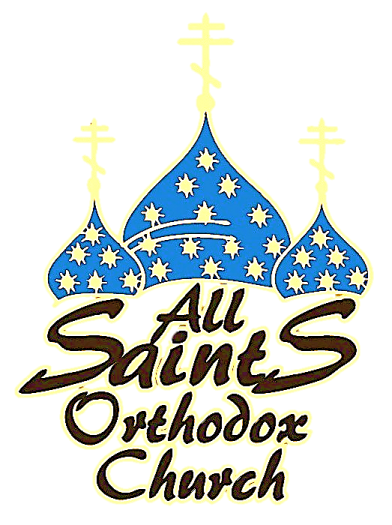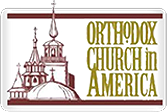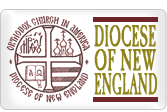
Baptism is the first in a series of rites through which one is initiated or received into the Orthodox Church, the other two being Chrismation and Holy Communion.
Baptism is the Mystery/Sacrament by which a person who believes in Jesus Christ dies unto his or her former sinful life and receives purification, illumination, forgiveness, protection, and adoption as a child of God. A baptized person becomes one with Christ, unified with His Body and the Church, by being buried (in the waters of baptism) and being being raised up to new life in Christ.
Preparatory rites and prayers preced the baptism itself, explaining the deep meaning of baptism and providing an opportunity for the individual to renounce all evil and make a committment to unite themselves to Christ.
One is baptized in the Orthodox Church through immersion three times with the words: “The servant of God _____ is baptized in the name of the Father, and of the Son, and of the Holy Spirit.”
After baptism, one is Chrismated. Through the anointing of Chrism (special oil) the newly-baptized receives “the seal of the Gift of the Holy Spirit,” power from on high to live a Christian life, the indwelling ofthe Holy Spirit, and special spiritual gifts for the benefit of the Church and the glory of God.
Once one has been received into the Orthodox Church through baptism and chrismation, he or she receives Holy Communion, thus becoming fully united with Christ and His Body, the Church, through the reception of His most pure Body and most precious Blood in the mystery of the Eucharist.
The Orthodox Church baptized and chrismates and communes infants and adults. Both children and adults are required to have Godparents (sponsors) that are pious Orthodox Christians who are able and willing to instruct, guide, and mentor them in the Faith. In the case of infants, Godparents offers the promise of commitment and the confession of Faith on behalf of the child.
If you, a friend, or a member of your family is interested in baptism, please contact us to schedule an appointment to discuss your/his/her entrance into the Orthodox Church.

The rite of Chrismation is most often celebrated as part of a baptism, however Chrismation is also one of the ways by which those who have been baptized outside of the Orthodox Church may be received into the Orthodox Church.
One is Chrismated on the forehead, eyes, nose, lips, breast, hands, and feet with the words, “The Seal of the Gift of the Holy Spirit,” in order to sanctify the mind, body, and soul and all the senses… One receives the gift of the Holy Spirit and sanctification of ones heart and mind…to hear the voice of God and see the Truth and to be cognizant that every breath he or she breaths is a gift from God…he or she is commisioned to use, at every opportunity and with every breath, one’s hands, feet, and mouth to spread the gospel of Jesus Christ.
Those Christians who –having received Trinitarian baptism in their communities— wish to be a part of Christ’s One, Holy, Catholic, and Apostolic Church may be have their baptism “completed” and receive the Holy Spirit through Holy Chrismation, Penance, Confession of Faith, and Holy Communion in the Orthodox Church. Those from non-Christian groups/religions (Jews, Muslims, Buddhists, etc.) or those from non-Trinitiarian “Christian” communities (Unitarians, Jehova’s Witnesses, Mormons, etc.) would need to also receive Holy Baptism.
Those who have previously been Chrismated/Confirmed (Armenians, Roman/Byzantine Catholics, Coptics, etc.) may also be received through Anointing on the forehead, Penance, Confession of Faith, and Holy Communion.
If you would like to be received into the Orthodox Church from another confession, please contact us.

Excerpts from “The Orthodox Faith” by Protopresbyter Thomas Hopko:
The Holy Eucharist is called the “sacrament of sacraments” in the Orthodox tradition. It is also called the “sacrament of the Church.” The eucharist is the center of the Church’s life. Everything in the Church leads to the eucharist, and all things flow from it. It is the completion of all of the Church’s sacraments—the source and the goal of all of the Church’s doctrines and institutions.
As a word, the term eucharist means thanksgiving. This name is given to the sacred meal-not only to the elements of bread and wine, but to the whole act of gathering, praying, reading the Holy Scriptures and proclaiming God’s Word, remembering Christ and eating and drinking his Body and Blood in communion with him and with God the Father, by the Holy Spirit. The word eucharist is used because the all-embracing meaning of the Lord’s Banquet is that of thanksgiving to God in Christ and the Holy Spirit for all that he has done in making, saving and glorifying the world.
The sacrament of the eucharist is also called holy communion since it is the mystical communion of men with God, with each other, and with all men and all things in him through Christ and the Spirit. The eucharistic liturgy is celebrated in the Church every Sunday, the Day of the Lord, as well as on feast days. Except in monasteries, it is rarely celebrated daily. Holy Communion is forbidden to all Orthodox Christians on the week days of Great Lent except in the special communion of the Liturgy of the Pre-sanctified Gifts because of its joyful and resurrectional character. The eucharist is always given to all members of the Church, including infants who are baptized and confirmed. It is always given in both forms—bread and wine. It is strictly understood as being the real presence of Christ, His true Body and Blood mystically present in the bread and wine which are offered to the Father in his name and consecrated by the divine Spirit of God.
The mystery of the holy eucharist defies analysis and explanation in purely rational and logical terms. For the eucharist—and Christ Himself—is indeed a mystery of the Kingdom of Heaven which, as Jesus has told us, is “not of this world.” The eucharist—because it belongs to God’s Kingdom—is truly free from the earth-born “logic” of fallen humanity.

The Mystery of Reconciliation, sometimes referred to as the “Sacrament of Penance,” or simply as “Confession,” is a “second baptism, a baptism of tears,” in which one confesses his or her sins and asks for forgiveness and healing.
Confessions are heard after Saturday night Vespers. To schedule confession please contact us.

Excerpt from “The Orthodox Faith” by Protopresbyter Thomas Hopko:
In the sacrament of marriage, a man and a woman are given the possibility to become one spirit and one flesh in a way which no human love can provide by itself. In Christian marriage the Holy Spirit is given so that what is begun on earth does not “part in death” but is fulfilled and continues most perfectly in the Kingdom of God.
For centuries there was no particular ritual for marriage in the Church. The two Christians expressed their mutual love in the Church and received the blessing of God upon their union which was sealed in the holy eucharist of Christ. Through the Church’s formal recognition of the couple’s unity, and its incorporation into the Body of Christ, the marriage became Christian; that is, it became the created image of the divine love of God which is eternal, unique, indivisible and unending.
When a special ritual was developed in the Church for the sacrament of marriage, it was patterned after the sacrament of baptism-chrismation. The couple is addressed in a way similar to that of the individual in baptism. They confess their faith and their love of God. They are led into the Church in procession.
They are prayed over and blessed. They listen to God’s Word. They are crowned with the crowns of God’s glory to be his children and witnesses (martyrs) in this world, and heirs of the everlasting life of his Kingdom. They fulfill their marriage, as all sacraments are fulfilled, by their reception together of holy communion in the Church.
There is no “legalism” in the Orthodox sacrament of marriage. It is not a juridical contract. It contains no vows or oaths. It is, in essence, the “baptizing and confirming” of human love in God by Christ in the Holy Spirit. It is the deification of human love in the divine perfection and unity of the eternal Kingdom of God as revealed and given to man in the Church.
The Christian sacrament of marriage is obviously available only to those who belong to the Church; that is, only for baptized communicants. This remains the strict teaching and practice of the Orthodox Church today. Because of the tragedy of Christian disunity, however, an Orthodox may be married in the Church with a baptized non-Orthodox Christian on the condition that both members of the marriage sincerely work and pray for their full unity in Christ, without any coercion or forceful domination by either one over the other. An Orthodox Christian who enters the married state with a non-Orthodox Christian must have the sacramental prayers and blessings of the Church in order to remain a member of the Orthodox Church and a participant in the sacrament of holy communion.

Holy Orders, or Ordination, is one of the Mysteries of the Orthodox Church by which the Bishops, as succesors of the Apostolic witness, canonically select and ordain individual members of the Church to serve the Body of Christ.
Though all Orthodox Christians become members of the “Royal Priesthood” of Christian believiers, each with a calling and a responsibility to reconcile creation with it’s Creator, to share the gospel of Jesus Christ, to make sacrifices and offer one’s self totally for the work of Christ’s Church, some are called to serve the faithful of the Orthodox Church as part of the “Ministerial Priesthood.”
Since in one sense all Orthodox Christians are called to be “priests,” that is all Orthodox Christians are called to serve and minister to the people around them, offering prayers for them and pointing them towards Christ, an Orthodox priest is, essentially, a priest for priests. Orthodox clergy are ordained to serve God and the Church in a specific and special way by devoting their life to the building up of the Body of Christ through tending the flock of Christ through leadership, prayer, performing the Sacraments of the Church, teaching and preaching, administration, and other duties according to the needs of the Faithful. Though priests are given the authority to celebrate Baptism, Chrismation, the Holy Eucharist, Holy Matrimony, hear Confessions, and perform the rite of Unction, only Bishops can ordain other members of the clergy. Before one may be ordained in one order, they must also be ordained to the order below it.
The Orders of Clergy in the Orthodox Church are as follows:
Major Orders
Bishops: From “Episkopos,” which means “overseer.”Those charged with holding steadfastly to the canons and teachings of the True Faith of the Apostles and ensuring the Unity of the Orthodox Church through Orthodox teaching, preaching, and administration within the Church; also selects and ordains priests, deacons, subdeacons, and readers for service to the Church. Bishops must be celibate men who have been tonsured (or are willing to be tonsured) to the first order of Monasticism. Widowed men may also be consecrated as Bishops.
Priests: From “Presbyteros,” which means “elder.”Those assigned by the local bishop to administer and lead a local Eucharistic community in the Faith as pastors, leading worship during the Divine Services, preaching and teaching the Faithful, and performing the Mysteries of the Church and other Services of Need under the guidance and with permission of the Diocesan Hierarch. This permission is seen in the antimension or corporal, a specially decorated cloth with iconography on which the Liturgy is served. It is signed by the bishop and is unfolded during the Liturgy; without it, no services may be held in the parish. The Orthodox Church ordains both married and celibate men as priests, however priests may not marry after ordination to the diaconate.
Deacons: From “Diakonos,” which means “servant” or “minister.”Those who are ordained to assist the priest and/or bishop in the Divine Services, and the work of the Church. The deacon proclaims the Gospel, assists in the preparation and distribution of Holy Communion, censes, calls people to prayer, and leads litanies. A deacon may not perform any Mystery of Sacrament of the Church on his own, and indeed may not vest without permission from a bishop or priest. Deacons are an important part of the ministry in the Orthodox Church. The Diaconate is not simply a “step” or “transitional point” towards the priesthood, but is a vital liturgical and ministerial role in and of itself. The Orthodox Church ordains both married and celibate men as deacons, however deacons may not marry (or re-marry) after ordination.
Minor Orders
Subdeacons: From “Ipodiakonos,” which means “under – servant/minister.” Those who are ordained to assist the Bishop, Priest, and Deacons. They are, essentially, tasked with serving in the Altar and are blessed to touch the Holy Altar, as necessary, with the blessing of the Bishop or Priest.
Readers: Those who are ordained to read and chant the Epistle, prokeimenoa and Alleluia, the Psalms, and other responses. This is the first order of the Priesthood and part of the service includes a tonsuring, or cutting of the hair, to set them apart as members of the clergy.
If you are feeling called to ordained service in the Orthodox Church, please contact us.

An Excerpt from “The Orthodox Faith” by Protopresbyter Thomas Hopko:
Christ came to the world to “bear the infirmities” of men. One of the signs of his divine messiahship was to heal the sick. The power of healing remains in the Church since Christ himself remains in the Church through the Holy Spirit.
The sacrament of the unction of the sick is the Church’s specific prayer for healing. If the faith of the believers is strong enough, and if it is the will of God, there is every reason to believe that the Lord can heal those who are diseased.
Is any among you sick, let him call for the presbyters of the church, and let them pray over him, anointing him with oil in the name of the Lord; and the prayer of faith will save the sick man, and the Lord will raise him up; and if he has committed sins, he will be forgiven. Therefore, confess your sins to one another and pray for one another, that you may be healed (Jas 5.14–16; see also Mk 6.13).
The sacrament of anointing is a “sobornal” sacrament in the traditional Orthodox practice. This means that as many of the faithful as possible are gathered to participate in the prayers. The rite itself calls for seven priests, seven readings from the epistles and gospels, seven prayers and seven anointings with oil specifically blessed for the service. Although it is not always possible to perform the sacrament in this way, the normal procedure is still to gather together as many priests and people as possible.
The express purpose of the sacrament of holy unction is healing and forgiveness. Since it is not always the will of God that there should be physical healing, the prayer of Christ that God’s will be done always remains as the proper context of the sacrament. In addition, it is the clear intention of the sacrament that through the anointing of the sick body the sufferings of the person should be sanctified and united to the sufferings of Christ. In this way, the wounds of the flesh are consecrated, and strength is given that the suffering of the diseased person may not be unto the death of his soul, but for eternal salvation in the resurrection and life of the Kingdom of God.
It is indeed the case that death inevitably comes to man. All must die, even those who in this life are given a reprieve through healing in order to have more time on the earth. Thus, the healing of the sick is not itself a final goal, but is merely “instrumental” in that it is given by God as a sign of his mercy and as a grace for the further opportunity of man to live for him and for others in the life of this world.
In the case where a person is obviously in the final moments of his earthly life, the Church has special prayers for the “separation of soul and body.” Thus, it is clear that the sacrament of holy unction is for the sick-both the physically and mentally sick-and is not reserved for the moment of death. The sacrament of unction is not the “last rites” as is sometimes thought; the ritual of the anointing itself in no way indicates that it should be administered merely in “extreme” cases. Holy unction is the sacrament of the spiritual, physical, and mental healing of a sick person whatever the nature or the gravity of the illness may be.

The funeral service in the Orthodox Church, although not considered as specifically sacramental, belongs among the special liturgical rites of the People of God.
We have already seen that the Church has a particular sacramental service for the consecration of human suffering, and special prayers for the departure of the soul from the body in death. When a person dies, the Church serves a special vigil over the lifeless body, called traditionally the parastasis or panikhida, both of which mean a “watch” or an “all-night vigil.”
The vigil of the dead should normally be fulfilled in the eucharistic liturgy in which the faithful meet the Risen Lord, and all those who are alive in him, in the glory of his Kingdom of Life. The fact that the funeral vigil, in recent years, has lost its preparatory character and has simply been transformed into the funeral service itself, separated from the eucharistic liturgy, is a sad fact which allows neither for the proper appreciation of the vigil itself nor for the full Christian vision of the meaning of life, death and resurrection in Christ, the Church and the Kingdom of God.
To schedule a funeral or pannikhida (memorial service), please contact us!



